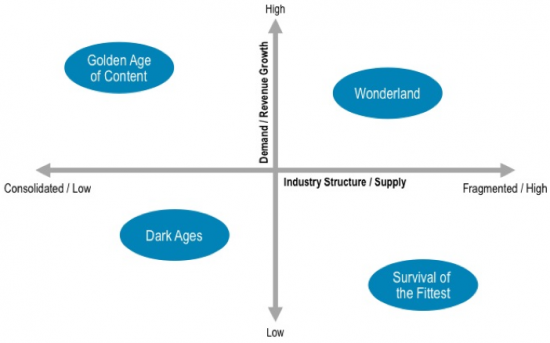































In the midst of tremendous disruption, it is impossible to tell where the global media industry is ultimately heading. But a recent analysis from the Cisco Internet Business Solutions Group (IBSG) explores four possible future scenarios for the media industry. While they do not "predict" the future, the scenarios help build our understanding of possible outcomes - and how various industry players could be affected.
The Shape of Things To Come: Four Scenarios
We explored the ways certain industry developments could swing future outcomes. Combining these drivers into logical groupings (consumer behavior, regulatory requirements, technology, and macroeconomic conditions), we were able to define the following four scenarios, as shown in Figure 1. These scenarios are differentiated by consumer demand, industry structure, and content supply:
Obviously, each of the scenarios will have different winners and losers. The financial impact and the implications for players across the industry value chain will substantially change by scenario. And in each scenario, distributors and infrastructure providers will need to consider different types of investments. Consequently, each type of player will need to adapt its competitive responses to the future scenario taking shape.
Figure 1. Four Future Scenarios Are Based on Various Groupings of Industry Drivers.
 Source: Cisco IBSG, 2013
Source: Cisco IBSG, 2013
Following are examples of how two future scenarios could play out:
Dark Ages
In the Dark Ages scenario, a poor macroeconomic environment results in a shrinking market, restricted investment, and consumers' unwillingness to spend. Strictly enforced net neutrality slows large CapEx investments, but accelerates deployment of analytic engines used to optimize networks. Privacy rules give the advantage to large content distributors with many content sources and large footprints.
Under a Dark Ages scenario, overall global revenue will be flat from 2012 to 2017, at just under$1 trillion, with fixed and mobile access being the only revenue segment with significant growth (see Figure 2).
Service providers(SPs) in the Dark Ages scenario can achieve scale through consolidation, and should focus on cloud services. Forcontent aggregators, the Dark Ages scenario will be an opportunity to refocus on ad revenues and rentals.Content ownersshould increase focus on combating piracy and reducing production costs. They can maintain tight pricing controls by taking advantage of exclusive distribution deals and tightly controlled windows.
Survival of the Fittest
In this scenario, the industry also suffers from a challenging macroeconomic environment and a shrinking market. However, there is a high supply of content as a result of alternative funding sources, better and less expensive video production and postproduction, and consumerized, high-end automated creative tools. Service providers' access to consumer data gives them incentives to deploy ad-based models and to monetize data. Over-the-top video distribution drives consumers' demand for broadband and encourages targeted broadband investments.
Figure 2. Different Segments Benefit from Different Scenarios, and Their Risk Levels Vary Greatly.

Source: Cisco IBSG, 2013
Revenue under the Survival of the Fittest scenario dips slightly in the five years following 2012, with fixed and mobile access taking share from other revenue segments. In this scenario, broadband investments provide the safest source of growth for SPs.
In the Survival of the Fittest scenario,SPsshould focus on data collection and monetization, as well as cloud distribution of content, and should implement agile operational models.Content aggregatorsshould concentrate on data collection and targeted ads, and will need to capitalize on semiprofessional content. Forcontent owners, Survival of the Fittest means investment in lower-cost content production, including automated production/workflow, and use of "platform release" to optimize marketing and distribution costs.
Conclusion
While scenario planning never completely reflects future realities, it can help us understand possible directions in which the industry might move under various conditions. Each of the four scenarios has profound implications on market size, margins, and success of various players within the value chain. As we have seen above, even under the two most challenging scenarios, there are ways for SPs to grow.
For a more complete discussion of industry drivers, revenue impact, and the four scenarios we have identified, please see our Point of View paper, "The Future of Media: 'Dark Ages' or 'Wonderland'?"
 Tags chauds:
nuage
infrastructures
Haut débit
IBSG
cloud services
monetization
media
Contenu du site
media industry
Tags chauds:
nuage
infrastructures
Haut débit
IBSG
cloud services
monetization
media
Contenu du site
media industry